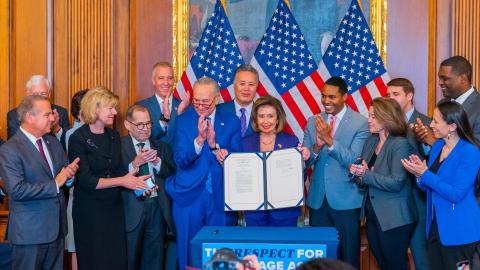Equality Caucus Marks Intersex Awareness Day
WASHINGTON, DC – Today, the Congressional Equality Caucus released the following statement commemorating Intersex Awareness Day. Intersex Awareness Day honors the first public demonstration by intersex people in the United States, which took place at the annual conference of the American Academy of Pediatrics on October 26, 1996. Since 1996, it has become a day during which intersex people and allies come together to celebrate and uplift the intersex community.
"For far too long, intersex people have been left out of the conversation when discussing inclusivity, health equity, and equality for all," said Equality Caucus Chair Mark Pocan (WI-02). "Today and every day we must uplift members of the intersex community and recommit to ensuring all levels of government are prioritizing the needs of the intersex community. That's why I was glad to join Co-Chair Becca Balint in introducing the first congressional resolution to recognize Intersex Awareness Day today."
"Intersex people must be recognized a valid and seen within the LGBTQI+ community. This resolution is an important step in uplifting the intersex community and fighting interphobia," said Equality Caucus Co-Chair Becca Balint (VT-AL). "I'm proud to join Equality Caucus Chair Mark Pocan in working toward intersex awareness and equality."
Intersex refers to having innate variations in physical traits that differ from typical expectations for male or female bodies regarding the development, appearance, or function of sex-related characteristics. This includes variations in one or more traits such as genitals, gonads and other reproductive organs, hormone production or response, or chromosome patterns, which may present at birth or may occur naturally at a later time.
Co-Chair Becca Balint (VT-AL) and Chair Mark Pocan introduced an Intersex Awareness Day Resolution today which:
- Supports the goals and ideals of Intersex Awareness Day;
- Encourages the Federal Government, States, localities, nonprofit organizations, schools, and community organizations to observe the day with appropriate programs and activities, with the goal of increasing public knowledge of the intersex community and empowering individuals to celebrate and respect their diversity;
- Encourages health care providers to offer culturally and clinically competent care to the intersex community, and schools to support education regarding the intersex community, and connect individuals to resources for young people with intersex variations and their families; and
- Encourages the Federal Government, States, international funding organizations, and United States bilateral and multilateral aid efforts to prioritize the health and human rights of intersex people.
This resolution is the latest example of the Congressional Equality Caucus' work to advance intersex equality. At the end of last Congress, the Congressional Equality Caucus updated its bylaws to make clear that the caucus is dedicated to ending discrimination on the basis of sex characteristics, including intersex traits, in addition to discrimination on the basis of sexual orientation and gender identity and expression.
Earlier this year, Chair Pocan led a letter to the Department of Health and Human Services in response to their request for information on promising practices for advancing health equity for intersex individuals. The letter expressed strong support for the Administration's plan to publish a report on this topic and recommended specific areas the report should focus on in order to further health equity for intersex people.
The House has introduced several intersex-inclusive bills this Congress, including H.R. 15, the Equality Act, which would ensure explicit nondiscrimination protections for the LGBTQI+ community in key areas of life. The bill explicitly clarifies that prohibited sex discrimination includes discrimination on the basis of sex characteristics, including intersex traits.
###
